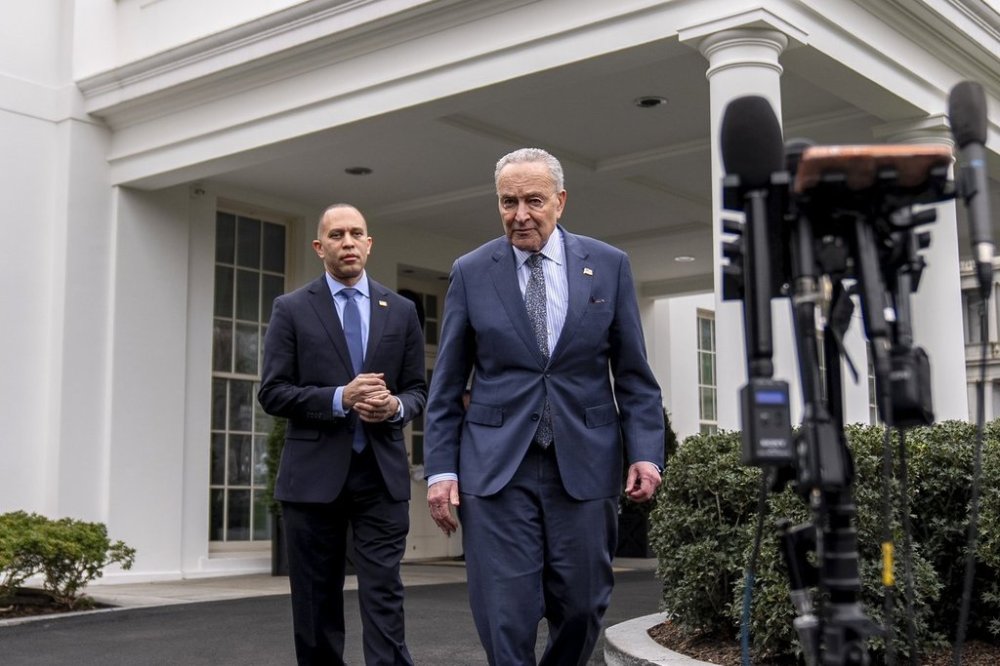World
Senate Leaders Stand Firm as Deadline Approaches for Government Funding

As the deadline for government funding approaches, tensions are escalating between Senate Democrats and Republicans. Chuck Schumer, the top Senate Democrat, and John Thune, the Republican Majority Leader, are taking firm stances ahead of a crucial meeting at the White House with President Donald Trump on Monday. Both parties seem reluctant to compromise, raising concerns about a potential government shutdown.
Republicans insist that Democrats must support a straightforward extension of government funding by Tuesday night to avert a shutdown. Thune emphasized in an interview on NBC’s “Meet the Press” that “the ball is in their court,” referring to the Democrats. He noted that a bill already exists in the Senate, passed by the House, which would keep the government operational. “We could pick it up today and pass it,” Thune asserted.
Negotiations at a Standstill
On the other hand, Schumer expressed a desire for immediate discussions on health care issues and warned that Democrats are prepared to allow a government shutdown if necessary. He stated, “God forbid the Republicans shut the government down. The American people will know it’s on their back.” This standoff is not an isolated incident; it reflects the recurring funding disputes that have characterized recent congressional sessions.
As the situation unfolds, Democrats appear increasingly willing to embrace a shutdown, driven by pressure from their base to confront the Republican-led Congress more aggressively. Schumer articulated the urgency of addressing health care needs, saying, “We’re hearing from the American people that they need help on health care.” He further pointed out that the ongoing layoffs in government jobs are already taking place, implying that a shutdown might not significantly alter the current landscape.
The Senate is scheduled to vote on the House-approved funding bill on Tuesday, with a critical deadline looming at 12:01 a.m. on Wednesday. The bill proposed would extend government operations for another seven weeks, allowing Congress additional time to finalize annual spending bills. For this short-term fix to pass, Republicans will need support from at least eight Democrats, as Senator Rand Paul of Kentucky is expected to oppose it. With Republicans holding 53 seats, they require 60 votes to overcome a filibuster.
Healthcare and Legislative Implications
Schumer highlighted the importance of a serious negotiation during the White House meeting, which will include congressional leaders such as Hakeem Jeffries, the House Minority Leader, and Mike Johnson, the House Speaker. He expressed hope that the meeting would not devolve into conflict, stating, “If the President at this meeting is going to rant and just yell at Democrats… we won’t get anything done.”
The backdrop of these negotiations includes significant concerns among Democrats regarding the expiration of Affordable Care Act tax credits, which have made health insurance more accessible for millions since the COVID-19 pandemic. With open enrollment beginning in November, the potential loss of these tax credits poses risks for low- and middle-income families.
While some Republicans have indicated a willingness to extend the tax credits, they advocate for reforms to address perceived issues within the program. Thune described the current system as “desperately in need of reform” and criticized it for being “fraught with waste, fraud, and abuse.”
The White House has also warned of potential mass layoffs among federal workers should a shutdown occur. Johnson emphasized the need for bipartisan cooperation, stating, “We want to find a bipartisan path forward and reach a spending agreement with our Republican colleagues that actually meets the needs of the American people.” He criticized Schumer’s approach, suggesting it was aimed at gaining political leverage among the far-left faction of his party.
As negotiations continue, the urgency for a resolution grows, particularly with health care costs expected to rise imminently. Jeffries articulated the need for action, asserting that “time is of the essence” to prevent higher costs from affecting everyday Americans.
The upcoming days are critical as both parties prepare for what could be a pivotal meeting at the White House, with the stakes high for both governmental operations and the ongoing health care debate.
-

 Science2 months ago
Science2 months agoToyoake City Proposes Daily Two-Hour Smartphone Use Limit
-

 Health2 months ago
Health2 months agoB.C. Review Reveals Urgent Need for Rare-Disease Drug Reforms
-

 Top Stories2 months ago
Top Stories2 months agoPedestrian Fatally Injured in Esquimalt Collision on August 14
-

 Technology2 months ago
Technology2 months agoDark Adventure Game “Bye Sweet Carole” Set for October Release
-

 World2 months ago
World2 months agoJimmy Lai’s Defense Challenges Charges Under National Security Law
-

 Technology2 months ago
Technology2 months agoKonami Revives Iconic Metal Gear Solid Delta Ahead of Release
-

 Technology2 months ago
Technology2 months agoSnapmaker U1 Color 3D Printer Redefines Speed and Sustainability
-

 Technology2 months ago
Technology2 months agoAION Folding Knife: Redefining EDC Design with Premium Materials
-

 Technology2 months ago
Technology2 months agoSolve Today’s Wordle Challenge: Hints and Answer for August 19
-

 Business2 months ago
Business2 months agoGordon Murray Automotive Unveils S1 LM and Le Mans GTR at Monterey
-

 Lifestyle2 months ago
Lifestyle2 months agoVictoria’s Pop-Up Shop Shines Light on B.C.’s Wolf Cull
-

 Technology2 months ago
Technology2 months agoApple Expands Self-Service Repair Program to Canada









